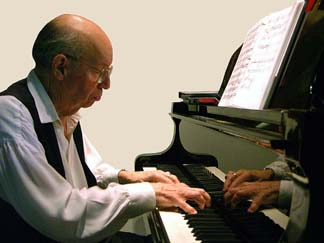Opera For Piano

Daniel Abrams (photo: Joy Moore)
If Only the Muse Loved Me as I Love Music
By FRANK BEHRENS
ART TIMES December 2008
Except for one brick wall: I could not sing and even my humming was in the skeleton key’Äîit fit every piece of music I essayed (and assailed). I began to envy musicians, who could simply sit down at the keyboard and dash off anything from a Bach triple fugue to "Take the A train" with no apparent effort.
I did not even dream of the ideal situation that existed for some people like Daniel Abrams. I had never heard of Mr. Abrams until recently, when a resident of Woodstock, NY and reader of Art Times Journal sent me an e-mail that pointed me towards the gentleman. When I responded, she sent me what amounted to a press kit about this pianist.
A New York Times review of a concert he gave in April 1957 calls him "an uncommonly good technician and it goes on to praise his playing of Brahms' "Handel" Variations as being "not that of technical slickness but of musical expressiveness." Having been awarded a two-year Fulbright Grant, he studied in London and gave concerts in at least five other European countries, garnering praise as he went along. As he gained more concert experience, he went on to more praise from critics in Canada and the United States.
Abrams' association with the Woodstock region alone should earn him an essay in this Journal; but that is not really my purpose. My point is that I now have another kind of person whom I can envy!
When the pianoforte was improved to what we are now used to, composers like Franz Liszt made the great melodies from opera accessible to the public by creating transcriptions of many arias for the keyboard. Naturally, he first played them himself at concerts and was admired for "making the piano sing," as he put it. The melodies were certainly true to what their original composers set onto paper, but more than just a little of Liszt's genius found its way into the transcribed versions.
My correspondent kindly sent me a CD, now out of print, that Abrams made in 2000. It is called "Fantasie Variations on Tales of Love" and holds three selections: "Fantasie Variations on Richard Wagner's 'Tristan und Isolde'," "Chaconne on Dido's Lament from Henry Purcell's 'Dido and Aeneas'," and "Fantasia on Carl Maria von Weber's 'Der Freischutz'."
Now there are many symphonic versions of music from "Tristan," but they usually follow the score note for note, assigning the vocal lines to certain instruments, and do little to interpret Wagner's music. Listening to Abrams' 19-minute rendition of his favorite sections from the long score, I can see where he is coming from. This is music he loves, and he wants to let his listeners know how and why he loves it.
His choosing "Freischutz" is taking something of a chance, because few operagoers have ever seen a production of that groundbreaking work, and recordings of that opera have never sold in the millions. But there is another point. Hearing Abrams' 14-minute approach to the work has made me want to hear the original again and possibly appreciate it more than I have in the past.
I read in the material sent to me that Abrams is working on a 40-minute piano treatment of the music from Wagner's Ring operas. In the past, I have heard too many mostly faithful readings of Wagner's non-vocal sections like "Siegfried's Funeral March" and "Magic Fire Music." What I now crave is an interpretation of this music, already so familiar to me in symphonic and operatic form, by someone like Abrams who can make me see it from another point of view.
So until the day my singing in the shower can inspire people to hear with fresh ears "Mefistofele" or "Sir John in Love," I have to leave it to people like Daniel Abrams to do it in their own inspired and inspiring way.
Note: For Mr. Abrams' own feelings about his music, please see his website at www.daniel-abrams.com




0 Comments:
Post a Comment
<$I18N$LinksToThisPost>:
Create a Link
<< Home